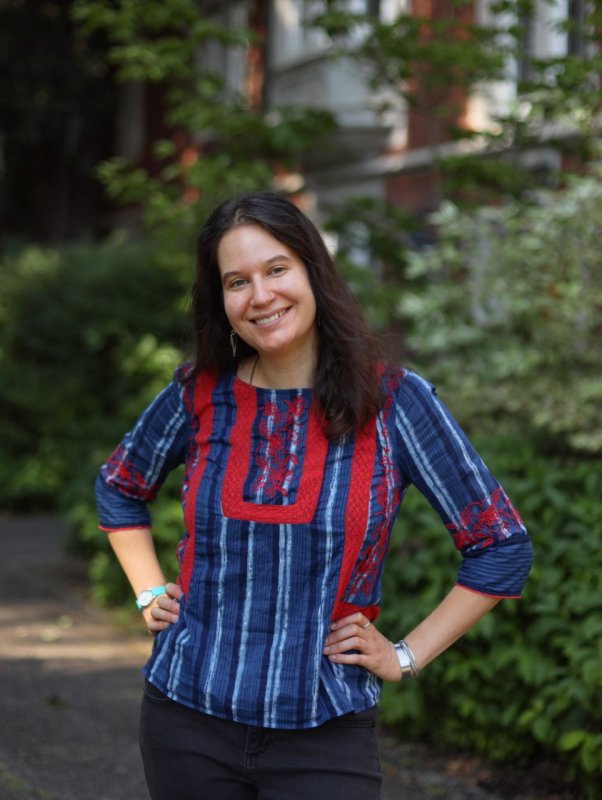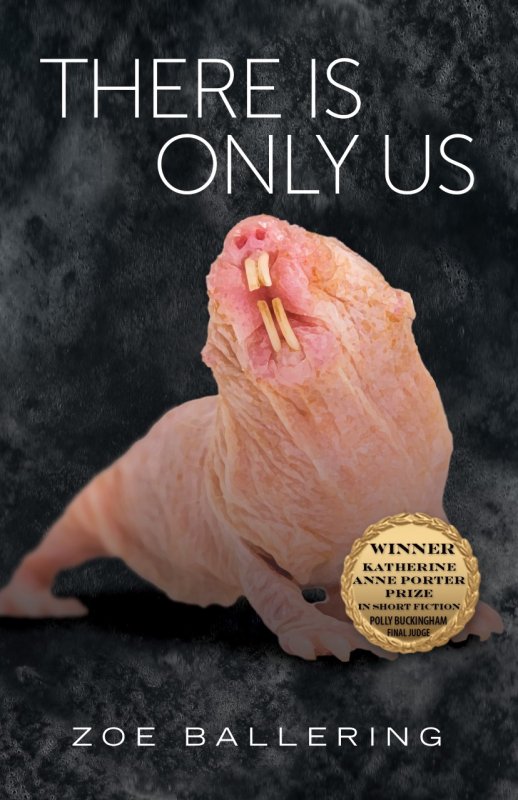Delightful, Tender, Lonely, and Strange: An Interview with Zoe Ballering, WWU Alumna and Author of Award-Winning Book, 'There Is Only Us'
by Max Owens
WWU Graduate School
Western Washington University alumna Zoe Ballering’s collection of short stories, There Is Only Us, released in November 2022, recently won the 2022 Katherine Anne Porter Prize in Short Fiction from the University of North Texas Press. From a satirical retelling of the story of Noah’s ark, to sisters transforming into naked mole rats, Ballering’s debut collection journeys into weird and wonderful worlds — all while examining the connections that bind us.
Ballering is a writer and teacher who lives in Portland, Oregon. She loves stories that are playful, tender, and strange, and her speculative fiction has appeared in Electric Literature’s Recommended Reading, Craft, Hobart, and elsewhere. Her writing is informed by her work in many different worlds: as the program manager for a historic tall ship, the receptionist at a garbage dump, an olive oil saleswoman, a teacher, a radio copywriter, and — currently — as the assistant dean of Admission Communication at Reed College.
Max Owens from WWU's Graduate School sat down with Ballering (MFA, '19) to talk about the strangeness of the world, weird jobs, and her experience as an MFA student in Western’s creative writing program.
MAX: In There Is Only Us, the utterly ordinary (frustrating bosses, high school, family) exists alongside the utterly weird (astronaut twins, a reversal of Genesis, unknowable secretions). Why this coexistence?
ZOE: The world is full of weird things. And I think we do an injustice to the world if we ignore that fact. It’s full of weird animals; it’s full of weird space stories. And not only is that just a fact, it’s also really fun. And so, I love to start with what I call a strange seed—and then I grow that seed up. And what I almost always find is that, regardless of how wacky it seemed at first, I end up at a place where I’m talking about relationships between people, which are always interesting and complex.
MAX: In “Ark,” the first story in the collection, the protagonist, Karis, is the caretaker for all the birds aboard Noah’s ark—but she mistakenly brings two male chickens along, upending the one male-one female rule. What “weird seed” did this story grow out of?
ZOE: “Ark” came out of my long-time fascination with chicken sexing. It’s a hugely important part of the modern poultry industry. Professionals can sex a thousand chicks an hour with incredible accuracy, often without being able to explain exactly how they know. Everyone else sucks at telling the difference between male and female chicks. So I was trying to imagine one of the earliest examples of how an inept chicken sexer would fail, big time, at their task.
MAX: How about “Substances: A School Year?” What’s the “weird seed” for a story about a group of high schoolers obsessed with categorizing the strange secretions oozing from their school?
ZOE: “Substances: A School Year” was inspired by a book from [my time at] Western—you all may still be reading it—The Norton Anthology of Theory and Criticism. It has a very bizarre brown smear for a cover. Were they going for dirt? Or poop? The cover got me thinking about how hard it is to separate innocuous substances from dangerous substances, and how upsetting that lack of clarity would be for a bunch of kids who love rules.
MAX: There Is Only Us is about relationships, but it’s also about loneliness. How does loneliness show up in these stories?
ZOE: The four stories in the beginning reflect this idea of There Is Only Us, like, a really small group of people in the world. There’s this aspect of creating these groups, or being forced to be part of these groups, and trying to navigate a hard, scary world. And then the second half of the book does have a lot to do with loneliness. It really looks at what it feels like to be in this enormous world and to have all these tools that seem to promise connection—and to still be really struggling to find that connection.
MAX: Animals feature prominently in your stories. Why?
ZOE: I wish I totally knew the answer. I mean, it is interesting to compare our experience with the world with animals’ experience of the world. I think that’s what interests me about naked mole rats: not only do they look absurd, and it’s impossible not to be awed by their appearance, but they seem to have really different experiences of the world, in the sense that scientists claim they cannot experience pain in the same way as human beings. So what does that mean for them? But also, what could that mean for us, if we could transform ourselves in that way?
I also just think the world is so full of beauty and wonder. I love science fiction as part of speculative fiction, but I also feel like I don’t necessarily need to go to space, you know, to find things that seem alien, and that are worth talking about. Animals are not literally alien—they’re terrestrial—but they sure feel like they are.
MAX: A lot of these stories were initially drafted pre-COVID. So, I’m curious how the pandemic shifted the way you thought about your stories, especially in terms of human connection and loneliness?
ZOE: Loneliness was a fact before the pandemic, and then during the pandemic, it was a much more present fact, I think. When I wrote many of the stories, I had no sense of what was coming towards us. But I think those stories can be read through the lens of the pandemic in really interesting ways. There’s one story about vaccines, and it’s totally different than vaccines as we talk about them now. But it does have these powerful themes about what choices we make for our bodies, and for people who are dependent on what choices we make for their bodies.
But then there are two other stories that I think of as total pandemic stories. And they have to do with quarantine, which is not something I had ever really thought about before 2020 in a real way. They have to do with feeling like parts of the world are vanishing around you—parts that you thought would always be there. I felt like I had to write those stories, because I had to deal with the hard things going on in my life.
MAX: You’ve had some weird jobs—you were the program coordinator for a tall ship, a radio copywriter, and the receptionist at a garbage dump, among others. How have these strange jobs informed your work as a writer?
ZOE: I think it’s sort of a trope in author bios, but I wanted my own list of weird jobs. I think weird work has been one of the main ways I’ve learned about the world. There are so many worlds that it’s hard to know they exist, but then it’s like you pass through a tiny door, and there’s this giant labyrinth of knowledge and passion and people that you never knew about. In my writing, these things show up, sometimes in the smallest ways, but they do matter.
MAX: You started this book as a student in an MFA program here at Western. What was that experience like for you?
ZOE: I did, yes. I had a great time in the MFA program in many ways, but one of the things I’m most grateful for is that it gave me time to actually write something in a coherent, focused way. My collection has built a lot since then, but I made the initial foundation at Western—like, even the name of my thesis is the same as the name of my book.
Western is great because you get guidance, but you aren’t told you have to conform to a particular style. I felt like, Oh, I have the freedom to figure out who I want to be as a writer. Kelley Magee was my thesis advisor, and she not only mentored me during the program but also has continued to help me figure out, like, How do I go about publishing? And what do I do now that the book is going to be published? Basically, everything good that you can get from an MFA program, I got at Western.
MAX: Excellent, Zoe. Thanks for taking time to sit down with us and talk about your award-winning book! Any upcoming projects we should keep an eye out for?
ZOE: I’m working on some new short stories at the moment, but I would like—this year—to turn my attention to a novel. About what? Not sure, but I’m certain it will unite my favorite things: playfulness, tenderness, and strangeness.
Want to hone your craft as a writer and work alongside award-winning faculty? Read more about Western’s creative writing MFA.

